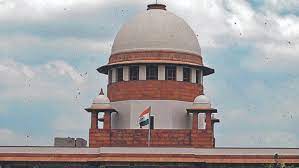This appeal is directed against the judgment and order dated 17.12.2020 passed by the High Court of Orissa, Cuttack in W.P. (C) No. 30620 of 2020 by which the High Court allowed the writ application filed by the original petitioner (respondent No. 1) before us, setting aside the order passed by the Central Administrative Tribunal (CAT), Cuttack Bench, Cuttack and thereby holding that the respondent No. 1 herein, namely, Dr. Bikartan Das is entitled to the benefit of enhancement of retirement age from 60 to 65 years as applicable to the AYUSH doctors working under the Ministry of AYUSH. (Para 1)
The appellant Council is an autonomous body registered under the Society Registration Act, 1860 and is administratively controlled by the Ministry of AYUSH, Government of India. It is a body constituted for the purpose of undertaking, cooperating, formulating, developing and promoting the research on scientific guidelines in Ayurvedic Sciences. The recruitment rules, procedure and the service conditions of these employees are governed by the Bye-Laws and Memorandum of Association of the Council. (Para 23)
There is nothing in Clause 35 of the Bye-Laws referred to above on the basis of which, it could be said that the same will have an overriding effect on Clause 34 as regards the age of retirement. Clause 47 of the Bye-Laws makes it abundantly clear that for the matters not specifically provided in the Bye-Laws, the rules applicable to the government employees would apply. However, as there is a specific provision regarding superannuation in Clause 34, the rules governing the government services in respect of superannuation are not applicable to the employees of the Council unless it is in accordance with Clause 34 of the Bye-Laws. (Para 29)
We reject the submission canvassed on behalf of the respondent No. 1 as regards the interpretation of the Clause 34 of the Bye-Laws. In this context, we may only say that the governing body of the Council is not obliged to take a decision in tune with the decision of the Ministry of AYUSH regarding superannuation more particularly having made it clear that enhancement of retirement age is not applicable to an autonomous body like CCRAS. (Para 34)
What should be the age of superannuation is a matter of policy. It is not within the domain of the court to legislate. It is only if a policy decision or a notification is arbitrary it may invite the frowns of Article 14 of the Constitution. In any case, the question of age of retirement stands on a different footing from the service conditions relating to pay and allowances and revision of pay. (Para 35)
The first cardinal principle of law that governs the exercise of extraordinary jurisdiction under Article 226 of the Constitution, more particularly when it comes to the issue of a writ of certiorari is that in granting such a writ, the High Court does not exercise the powers of Appellate Tribunal. (Para 50)
The second cardinal principle of exercise of extraordinary jurisdiction under Article 226 of the Constitution is that in a given case, even if some action or order challenged in the writ petition is found to be illegal and invalid, the High Court while exercising its extraordinary jurisdiction thereunder can refuse to upset it with a view to doing substantial justice between the parties. Article 226 of the Constitution grants an extraordinary remedy, which is essentially discretionary, although founded on legal injury. (Para 51)
We have no hesitation in reaching to the conclusion that a writ of certiorari is a high prerogative writ and should not be issued on mere asking. For the issue of a writ of certiorari, the party concerned has to make out a definite case for the same and is not a matter of course. (Para 64)
We have reached to the conclusion that the impugned order passed by the High Court is not sustainable in law and the same deserves to be set aside. (Para 78)
SUPREME COURT OF INDIA
2023 STPL(Web) 177 SC
[2023INSC733]
Central Council For Research In Ayurvedic Sciences & Anr. Vs. Bikartan Das & Ors.
Civil Appeal No. 5155 of 2023 Arising out of SLP (C) NO. 3543 of 2019-Decided on 16-8-2023
https://stpllaw.in/wp-content/uploads/2023/08/2023-STPLWeb-177-SC.pdf







